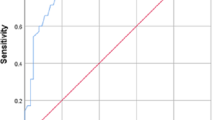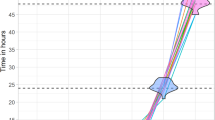Abstract
The present study analyzed serum levels of urea nitrogen (UN), creatinine (Cr), and C-reactive protein (CRP), which are very stable during the early postmortem period, for investigation of the cause of death with special regard to hyperthermia (heat stroke) in serial medico-legal autopsy cases (n = 429), excluding fatal injury, intoxication, and fire fatality. In this series, mechanical asphyxiation, drowning, and sudden cardiac death cases (n = 56, n = 43, and n = 212, respectively) usually showed low levels within postmortem reference ranges for these serum markers, although UN and CRP levels were mildly elevated in cases of sudden cardiac death and cerebrovascular stroke. There were concomitant significant elevations in serum levels of UN (>50 mg/dL), Cr (>2 mg/dL), and CRP (>2 mg/dL) for chronic renal failure, gastrointestinal bleeding, pneumonia, and hypothermia (cold exposure). UN and CRP were especially high for chronic renal failure and pneumonia, respectively. However, hyperthermia cases showed an isolated elevation in the serum Cr level, suggesting an influence of systemic skeletal muscle damage. These serum markers may be practically useful for postmortem investigation of death due to hyperthermia (heat stroke), for which specific pathological and toxicological evidence may not be available.

Similar content being viewed by others
References
Aghayev E, Thali MJ, Sonnenschein M, Hurlimann J, Jackowski C, Kilchoer T, Dirnhofer R. Fatal steamer accident; blunt force injuries and drowning in post-mortem MSCT and MRI. Forensic Sci Int 2005;152:65–71.
Coe JI. Postmortem chemistry update: emphasis on forensic application. Am J Forensic Med Pathol 1993;14:91–117.
Arroyo A, Valero J, Marron T, Vidal C, Hontecillas B, Bernal J. Pericardial fluid postmortem: comparative study of natural and violent deaths. Am J Forensic Med Pathol 1998;19:266–8.
Zhao D, Zhu BL, Ishikawa T, Li DR, Michiue T, Maeda H. Quantitative RT-PCR assays of hypoxia-inducible factor-1α, erythropoietin and vascular endothelial growth factor mRNA transcripts in the kidneys with regard to the cause of death in medicolegal autopsy. Legal Med 2006;8:258–63.
Madea B, Musshoff F. Postmortem biochemistry. Forensic Sci Int 2007;165:165–71.
Tsokos M, Püschel K. Postmortem bacteriology in forensic pathology: diagnostic value and interpretation. Legal Med 2001;3:15–22.
Osuna E, Perez-Carceles MD, Vieira DN, Luna A. Distribution of biochemical markers in biologic fluids: application to the postmortem diagnosis of myocardial infarction. Am J Forensic Med Pathol 1998;19:123–8.
Osuna E, Perez-Carceles MD, Alvarez MV, Noguera J, Luna A. Cardiac troponin I (cTn I) and the postmortem diagnosis of myocardial infarction. Int J Legal Med 1998;111:173–6.
Nishio H, Takai S, Miyazaki M Horiuchi H, Osawa M, Uemura K, Yoshida K, Mukaida M, Ueno Y, Suzuki K. Usefulness of serum mast cell-specific chymase levels for postmortem diagnosis of anaphylaxis. Int J Legal Med 2005;119:331–4.
Zhu BL, Ishikawa T, Michiue T, Li DR, Zhao D, Tanaka S, Kamikodai Y, Tsuda K, Okazaki S, Maeda H. Postmortem pericardial natriuretic peptides as markers of cardiac function in medico-legal autopsies. Int J Legal Med 2007;121:28–35.
Zhu BL, Ishida K, Quan L, Taniguchi M, Oritani S, Li DR, Fujita MQ, Maeda H. Postmortem serum uric acid and creatinine levels in relation to the causes of death. Forensic Sci Int 2002;125:59–66.
Zhu BL, Ishikawa T, Michiue T, Li DR, Zhao D, Quan L, Maeda H. Evaluation of postmortem urea nitrogen, creatinine and uric acid levels in pericardial fluid in forensic autopsy. Legal Med 2005;7:287–92.
Zhu BL, Ishikawa T, Michiue T, Tanaka S, Zhao D, Li DR, Quan L, Oritani S, Maeda H. Differences in postmortem urea nitrogen, creatinine and uric acid levels between blood and pericardial fluid in acute death. Legal Med 2007;9:115–22.
Richards JR, Johnson EB, Stark RW, Derlet RW. Methamphetamine abuse, rhabdomyolysis in the ED: a 5-year study. Am J Emerg Med 1999;17:681–5.
Lan KC, Lin YF, Yu FC, Lin CS, Chu P. Clinical manifestations and prognostic features of acute methamphetamine intoxication. J Formos Med Assoc 1998;97:528–33.
Kendrick WC, Hull AR, Knochel JP. Rhabdomyolysis and shock after intravenous amphetamine administration. Ann Intern Med 1977;86:381–7.
Logan BK, Fligner CL, Haddix T. Cause of death in fatalities involving methamphetamine. J Forensic Sci 1998;43:28–34.
McGee SM, McGee DN, McGee MB. Spontaneous intracerebral hemorrhage related to methamphetamine abuse-Autopsy findings and clinical correlation. Am J Forensic Med Pathol 2004;25:334–7.
Fujita MQ, Zhu BL, Ishida K, Quan L, Oritani S, Maeda H. Serum C-reactive protein levels in postmortem blood-an analysis with special reference to the cause of death and survival time. Forensic Sci Int 2002;130:160–6.
Hallett CJ, Cook JG. Reduced nicotinamide adenine dinucleotide-coupled reaction for emergency blood urea estimation. Clin Chim Acta 1971;35:33–7.
Taussky HH. A microcolorimetric determination of creatine in urine by the Jaffe reaction. J Biol Chem 1954;208:853–61.
Macintyre SS, Schultz D, Kushner I. Biosynthesis of C-reactive protein. Ann N Y Acad Sci 1982;389:76–87.
Yan YE, Zhao YQ, Wang H, Fan M. Pathophysiological factors underlying heatstroke. Med Hypotheses 2006;67:609–17.
Wang JL, Ke DS, Lin MT. Heat shock pretreatment may protect against heatstroke-induced circulatory shock and cerebral ischemia by reducing oxidative stress and energy depletion. Shock 2005;23:161–7.
Lee JJ, Lin MT, Wang NL, Lin CL, Chang CK. Platonin, a cyanine photosensitizing dye, causes attenuation of circulatory shock, hypercoagulable state, and tissue ischemia during heat stroke. Shock 2005;24:577–82.
Bouchama A, Knochel JP. Heat stroke. N Engl J Med 2002;346:1978–88.
Lugo-Amador NM, Rothenhaus T, Moyer P. Heat-related illness. Emerg Med Clin North Am 2004;22:315–27.
Zhu BL, Ishida K, Fujita MQ, Maeda H. Infant death presumably due to exertional self-overheating in bed: an autopsy case of suspected child abuse. Nihon Hoigaku Zasshi 1998;52:153–6.
Eshel GM, Safar P, Stezoski W. The role of the gut in the pathogenesis of death due to hyperthermia. Am J Forensic Med Pathol 2001;22:100–4.
Zhu BL, Ishida K, Quan L, Taniguchi M, Kamikodai Y, Fujita MQ, Maeda H. Post-mortem urinary myoglobin levels with reference to the causes of death. Forensic Sci Int 2001;115:183–8.
Smith ST. Nonprotein nitrogen. In: Bishop ML, Duben-Engelkirk JL, Fody EP, editors. Clinical chemistry: principles, procedures, correlations. New York; 1996. p. 341−54.
Ridker PM, Morrow DA. C-reactive protein, inflammation, and coronary risk. Cardiol Clin 2003;2:315–25.
Cusack MR, Marber MS, Lambiase PD, Bucknall CA, Redwood SR. Systemic inflammation in unstable angina is the result of myocardial necrosis. J Am Coll Cardiol 2002;39:1917–23.
Knight EL, Rimm EB, Pai JK, Rexrode KM, Cannuscio CC, Manson JE, et al. Kidney dysfunction, inflammation, and coronary events: a prospective study. J Am Soc Nephrol 2004;15:1897–903.
Auron A, Mhanna MJ. Serum creatinine in very low birth weight infants during their first days of life. J Perinatol 2006;26:755–60.
Author information
Authors and Affiliations
Corresponding author
Rights and permissions
About this article
Cite this article
Maeda, H., Zhu, BL., Bessho, Y. et al. Postmortem serum nitrogen compounds and C-reactive protein levels with special regard to investigation of fatal hyperthermia. Forensic Sci Med Pathol 4, 175–180 (2008). https://doi.org/10.1007/s12024-008-9029-9
Received:
Accepted:
Published:
Issue Date:
DOI: https://doi.org/10.1007/s12024-008-9029-9




